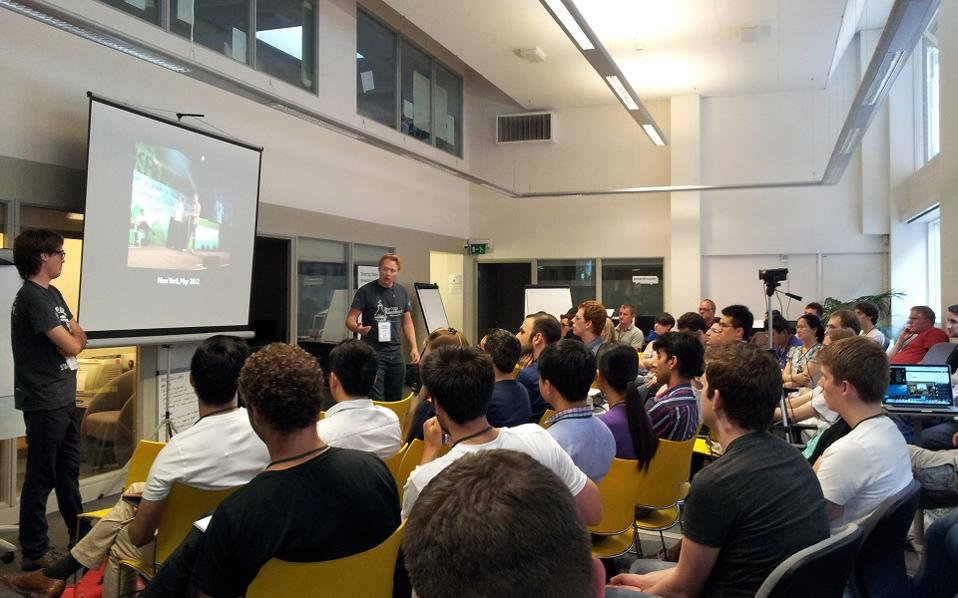Greece’s Silicon Valley, an economic bright spot, fights to survive crisis

Stepping into The Cube, a Greek startup incubator and co-working space, is like walking into a microcosm of Silicon Valley. With nine floors, 30 startup teams and 15 freelancers, it's the largest such space in Greece.
Bulletin boards are strewn with advertisements for hackathons and skills workshops. After six years of financial crisis, the innovation and new companies emerging from The Cube are a testament to the startup founders' resilience.
But the past few weeks have been tougher than anything they've seen before. Since June 29, capital controls – the restrictions on the flow of money outside Greece's borders – have prevented Greek companies from paying their foreign suppliers, Web hosts and Internet providers. Banks are still closed. Greek citizens are restricted to withdrawing 60 euros per day from ATMs. Foreign investors and customers have fled, hurting businesses of all sizes.
No matter how much startups have overcome in the past few years, it's been a time of soul-searching for entrepreneurs who now question whether they have a future in Greece. The latest economic and political meltdown could very well drive out the young Greeks who are poised to be the future of the Greek economy.
Within the span of one hour last week, three different startup founders stopped in to seek advice from entrepreneur Stavros Messinis, who started The Cube, on how to pay their rent, employees and bills. "See how much time we're wasting?" Messinis said when they finished. "We've spent 80 percent of our time on this in the last week."
Starting a business in Greece has never been easy. The country ranks 61st out of 189 economies on the World Bank's Ease of Doing Business list. The bureaucratic red tape is notoriously hard to navigate, and a slow judicial system means delays for things like zoning and land disputes. Tax laws are constantly changing. Greece has been losing human capital to other countries for years, especially among the younger generation, said Haris Makryniotis, managing director at Endeavor Greece, a global non-profit organization supporting entrepreneurship. The unemployment rate is above 25 percent, and more than 50 percent for Greek youth. But the lack of traditional job opportunities has also pushed young people to create their own opportunities, Makryniotis said.
Greece's startup ecosystem expanded at a respectable pace for the past few years, until it reached its current 400 or so companies. High-profile success stories include Taxibeat, a taxi-hailing smartphone app; Workable, online job-recruitment software; and BugSense, a mobile analytics platform for app developers that was acquired by San Francisco-based Splunk in 2013. Fledgling Greek startups have been helped along by EU and Greek government funding via local venture capital firms such as First Athens, Openfund, PJ Tech Catalyst, Odyssey Venture Partners and Attica Ventures.
But the growth of the ecosystem has slowed along with the Greek economy.
"Inevitably, it will shrink," said The Cube's Messinis, who also founded CampusBus, a campaign to teach people about entrepreneurship, finance and marketing from a busload of volunteers who visit towns and villages across Greece. "People are very mobile these days. There's very little that holds them back, other than listening to their mothers."
Several startup founders said their optimism about the viability of the startup ecosystem is fading. "I'm not sure the country will let it become what it deserves to become," said Nikos Anagnostou, the 55-year-old founder of Discoveroom, an app that helps property owners manage rental bookings.
Maintaining or attracting funding is a key problem. "Some investor-related discussions are frozen," Makryniotis said. "Even if they continue, they proceed with very different growth and profitability projections. And this of course has a negative effect on the valuation of the company."
Startups have been affected differently, depending on their business models. For Nannuka, an online service that connects parents to childcare experts, the past few weeks have pushed the company to focus on expanding abroad. About ninety percent of Nannuka's 8,000 customers come from Greece, and cash shortages mean they are reluctant to spend money right now.
"We didn't want to waste even one day thinking things over, lamenting the situation," said 24-year-old project manager Maria Arnaoutaki. "Instead we sped up all the actions that had to be done, setting the expansion of our business as a top priority."
At least a few companies are thinking of abandoning the Greek market. Online Greek travel agency Travelplanet24.com has been hit hard as major airlines, citing payment concerns due to capital controls, have halted ticket sales through Greek travel agents. Chief executive officer Philipp Brinkmann, 34, said his 300-person company, unlike most others in Greece, uses bank accounts in other countries and therefore had no problems processing customers' payments. But the lost ticket sales are enough that he'd rather not deal with future headaches of doing business here, he said. About 15 percent of his customers come from Greece.
Still others are waiting to see what happens. Twenty-eight-year-old Faye Gritsi moved back to Greece last fall to open a branch of the IT consulting company she worked for in London. "I want to give a chance to our generation, to give them decent jobs and decent salaries," Gritsi said. She hired half a dozen employees, who work at The Cube, and planned to launch this fall. But that all depends on whether Greece manages to avoid economic collapse.
Fellow Greek entrepreneurs have stepped in to help with short-term problems. BugSense cofounders John Vlachoyiannis and Panos Papadopoulos are leading a volunteer effort called ZeroFund to raise money for Greek startups with no way to pay for their online services. According to their website: "We changed the way that funding is done by having everyday people helping other people/ideas. Now, we need to help Greek companies survive this crisis."
At the very least, Greece's young entrepreneurs are honing their crisis management skills. "They're coming out of a country where nothing works, so they've developed skills and stamina and resilience that would not be easily taught in another environment," said Discoveroom's Anagnostou. "That will help them propel their startups higher than everybody else."
Indeed, though some are ready to leave a country in constant crisis, others are still determined to stay if they can. Said Gritsi: "I want to see my company grow here. We want to stay here and help change Greece."
[Reuters]





